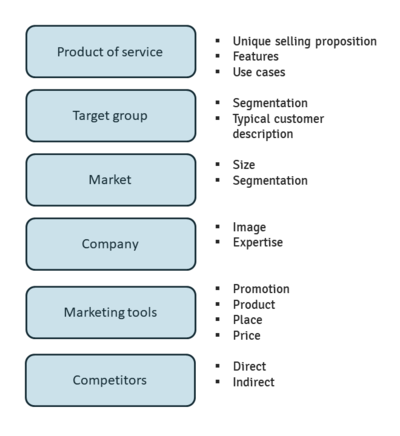Criteria of market strategy evaluation: Difference between revisions
(Infobox update) |
mNo edit summary |
||
| Line 20: | Line 20: | ||
==Strategy efficiency== | ==Strategy efficiency== | ||
[[File:marketing_strategy_elements.png|400px|right|thumb|Fig.1. Marketing strategy elements]] | |||
Marketing strategy can be effective only when it is based on a thorough [[knowledge]] of the [[market]]. [[Strategy]] implementation and execution may take place only when there is a consistency of plans for [[market]] penetration, [[price]] policy, advertising and distribution. | Marketing strategy can be effective only when it is based on a thorough [[knowledge]] of the [[market]]. [[Strategy]] implementation and execution may take place only when there is a consistency of plans for [[market]] penetration, [[price]] policy, advertising and distribution. | ||
Revision as of 10:56, 28 August 2020
| Criteria of market strategy evaluation |
|---|
| See also |
Criteria for the evaluation of the marketing strategy is a set of factors, parameters, characteristics, properties on the basis of which managers can assess the marketing strategy.
Strategic marketing is closely linked to the needs of individuals and organizations. As stated by Jean-Jacques Lambin "... the buyer is not looking for the product as such, but a product that can provide a solution to the problem." The most important role of strategic marketing is analysis of consumer needs, which allows observation of the evolution of the market and to identify existing and potential product markets. All companies should try to satisfy the needs of the customer. Marketing therefore extends to the entire culture and atmosphere in the organization.
Strategy efficiency
Marketing strategy can be effective only when it is based on a thorough knowledge of the market. Strategy implementation and execution may take place only when there is a consistency of plans for market penetration, price policy, advertising and distribution.
Marketing strategy is composed for specific tasks and goals of the company. This may be a problem with achieving financial gain or maintain existing market position. Intermediate objectives of the company, usually aim to maximize profit. Therefore, one of the criteria for assessing marketing strategy may be company final result measured by generated profit.
Marketing strategy can be assessed by measuring other results in the areas of products, distribution channels, pricing and marketing communications.
- Types of marketing strategy:
- development - focused on the increase in production, sales, investments, market position and profit,
- maintain the market position,
- selective development of selected products.
Marketing strategy can also be assessed from the point of view of the correctness, completeness and range of tools used in implementation.
See also:
References
- Chaffey, D., Ellis-Chadwick, F., Mayer, R., & Johnston, K. (2009). Internet marketing: strategy, implementation and practice. Pearson Education.
- Cravens, D. W., & Piercy, N. (2006). Strategic marketing (Vol. 7). New York: McGraw-Hill.
